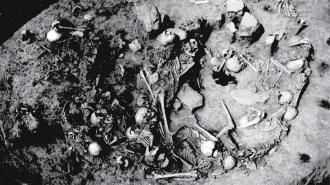Humans
New World’s oldest dog may have been dinner, plus worrisome PTSD and artful dodging in this week’s news
Scoring with evasive answers
Deftly dodging questions pays off — just ask successful politicians. That’s because people often don’t notice when someone avoids a question by talking about a similar topic, say Harvard psychologists Todd Rogers and Michael Norton. Listeners focus more on whether they like a speaker than on the content of a response, the researchers find. Detection of question dodging shoots up when listeners are told to pay attention to the relevance of a videotaped speaker’s answers to questions or if queries are displayed on-screen during answers, the researchers report in an upcoming
Journal of Experimental Psychology: Applied
. —
Bruce Bower
Oldest New World dog
DNA extracted from a 9,200-year-old skull fragment previously excavated in a Texas cave confirms that the bone comes from the oldest known dog in the New World, not a product of interbreeding between dogs and wolves. An analysis of mitochondrial DNA from the find, to appear in the
American Journal of Physical Anthropology
, indicates that ancient American dogs were domesticated from wolves in eastern Europe and western Asia. Researchers found the dog bone in fossilized human feces, indicating that early New World settlers not only kept dogs but ate them, say anthropologist Raul Tito of the University of Oklahoma in Norman and his colleagues. —
Bruce Bower
Daily worries inflame PTSD
Escalating worries about money, children and other aspects of daily life often stir up symptoms of post-traumatic stress disorder, at least among working class refugees. Cambodian immigrants to the United States who fled genocide and now experience trauma symptoms often experience worry-induced panic attacks, says a team led by psychiatrist Devon Hinton of Massachusetts General Hospital in Boston. “Worry attacks” spark and inflame PTSD symptoms such as traumatic memory flashbacks, a sense of impending doom and startle reactions to sudden noises, Hinton and his colleagues report in an upcoming
Social Science and Medicine
. The current clinical definition of PTSD doesn’t include worry attacks. —
Bruce Bower







